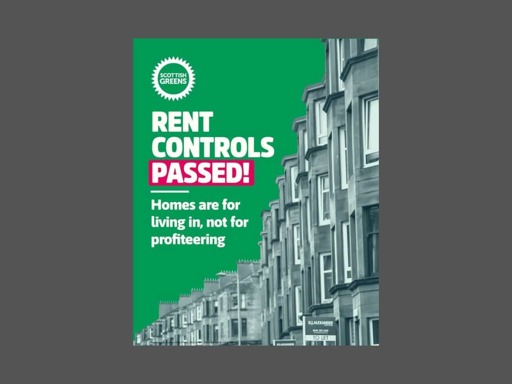The Scottish Green Party has secured a win for renters in Scotland, after Holyrood passed a bill that will reintroduce a system of rent controls across devolved nation.
Scotland is in with the rent controls, out with the lobbyist landlords
On Tuesday 30 September, Scottish parliament passed the new Housing (Scotland) Bill by 89 votes to 28.
As the BBC News reported:
Councils in Scotland will be able to cap rent increases on some properties at a maximum of 6% under a bill backed by MSPs.
Local authorities will be able to introduce controls in specially designated areas under the government’s Housing (Scotland) Bill, external.
In particular, the legislation:
creates provisions for new long-term measures by allowing ministers to designate parts of the country as rent control areas. This is expected to happen by 2027.
In those zones, councils will be able to limit rent increases to one percentage point above inflation (as measured under the Consumer Price Index), up to a maximum rent increase of 6%.
Significantly, the Scottish Greens pointed out how the “historic” bill introduces rent controls nearly four decades after Thatcher abolished them:
BREAKING
40 years ago Margaret Thatcher abolished rent controls in Scotland.
The Scottish Parliament just passed a Bill introduced by the Scottish Greens, which will allow them once more!
This will keep rents affordable and offer safety and stability to renters.
pic.twitter.com/LUnmbkdcVa
— Scottish Greens (@scottishgreens) September 30, 2025
Green MSP Maggie Chapman hailed the news, celebrating arresting the right to housing back from the landlord class:
Unions, renters, campaigners, we worked together to make a fairer housing sector.
We’ve claimed power back from the landlord lobby, and we’re not giving it back! https://t.co/JjMVqxmT2x
— Maggie Chapman MSP (@MaggieChapman) October 1, 2025
Chapman said:
This is a crucial bill that will bring back rent controls after too many years, and finally start to fix a rigged housing market that has worked in the interest of rogue landlords and developers rather than renters.
There is a lot in this bill to welcome, and it would not have happened without the work of Scottish Green MSPs who introduced it and housing and tenants campaigners who have worked around the clock to make it a reality.
Rent controls are common around the world, and they have been proven to work. They will help to make rents more affordable, offering safety and stability to support people to settle in their homes.
Homes are for living in and not for profiteering. Today’s vote is a crucial step to building a system that works for renters and families rather than the greedy developers and rogue landlords who have had their way for far too long.
A step in the right direction, but more to do
The Scottish Green Party was behind the efforts to curtail landlords extracting extortionate profits in tenants’ rent increases. Green MSP Patrick Harvie put forward the bill as part of the Scottish Greens’ New Deal for Tenants.
Its bill aimed to bring forward a slate of reforms to housing, including rent controls, eviction protections, and new rights such as the right to decorate homes and keep pets.
But notably, parliament watered down some of the key measures they had sought to introduce.
As the Guardian noted, the Scottish Greens had previously stipulated rent controls and tenants’ rights as “a key part of” its governing partnership with the SNP. Of course, this agreement collapsed last year. And the outlet detailed how:
the Scottish government’s housing minister, Màiri McAllan, announced last month that mid-market rent and build-to-let homes, including student accommodation, will be exempt from the cap because of concerns the measure could suppress housebuilding.
In other words, landlords lobbying against the bill were able to defang the rent cap. It means that there are still notable loopholes that will continue to leave renters at the mercy of profiteering landlords.
The Scottish tenants’ union Living Rent celebrated the victory, but noted on X it was:
the bare minimum that tenants need.
Ahead of the vote, the group had sent an open letter to Scottish First Minister John Swinney and Scottish housing ministers. It decried any capitulation to “disastrous” exemptions that landlords had been lobbying for in the bill.
On the news parliament had indeed let landlord influence shape the final legislation, Living Rent told the Guardian that the exemptions were:
a cowardly response to extensive lobbying from landlords
Moreover, it warned it could:
create a two-tier system of rent controls
Parliament has yet to decide the details of the regulations around these exemptions. It is set to agree these next year.
Other measures to overhaul the housing sector
Despite its shortfalls, the bill also introduced a sweep of other important protections for tenants.
This included Awaab’s law – which the UK government is set to begin bringing into force in the social rented sector this October. The death of 2-year-old Awaab Ishak from a severe respiratory disease brought on by black mould in his social housing, prompted the reforms.
The bill means that ministers will have new powers to make sure that landlords address damp and mould, and other issues hazardous to tenant’s health. Scotland will implement this across its rented sector from March 2026.
Alongside this, the bill will uncap council tax rates on second and empty homes.
Ultimately though, the win on rent controls still puts tenants’ rights barely at starting line. The housing sector – particularly for working class social tenants – is shamefully riddled with violations of people’s rights to not just a habitable, but safe and secure home.
And a system from the outset which lets some landlords continue their extortion racket will leave too many still fighting for their basic housing needs to be met.
Featured image via the Canary
From Canary via this RSS feed


